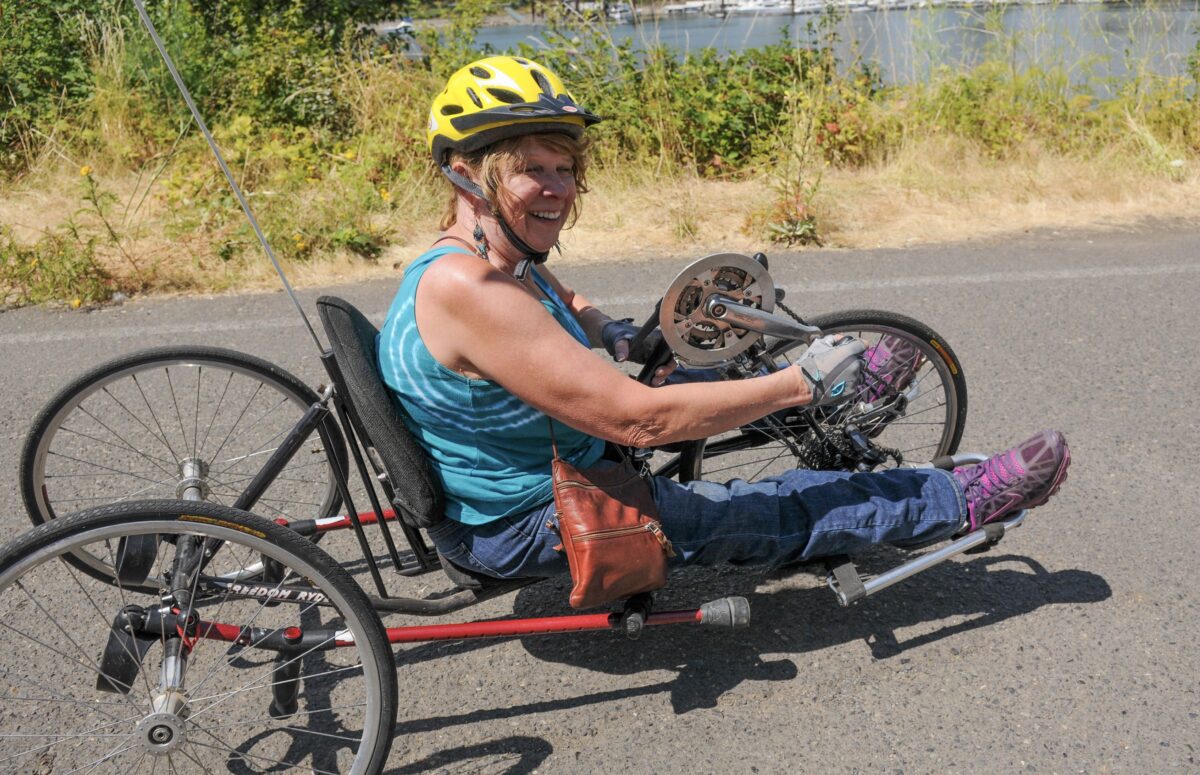
(Photo: Jonathan Maus/BikePortland)
“For the first time people with adaptive mobility devices will be recognized by the committees that represent them.”
— Chris Billman, advocate
A bill that will, “Ensure that the membership of [Oregon Department of Transportation] advisory committees reflects the racial and ethnic and ability composition of this state,” has passed the House and Senate and is headed to Governor Kate Brown’s desk.
As we reported last month, the idea for House Bill 2985 was hatched by Chris Billman, a Forest Grove man with scoliosis and other disabilities who cut his teeth as an activist in his fight to get a disabled vehicle placard for his recumbent bicycle.
Billman’s bill proved popular with Democrat and Republican legislators. It was supported 11-0 in the bipartisan Joint Transportation Committee then went on to pass the full House with 42 votes in favor (and 18 excused votes) and passed the full Senate by a vote of 24 to 3 (with 3 members excused). The three senators who voted against the bill were all Republicans: Bill Hansell (Athena), Dennis Linthicum (Klamath Falls), and Art Robinson (Cave Junction).
Advertisement
Here’s the text of the bill:
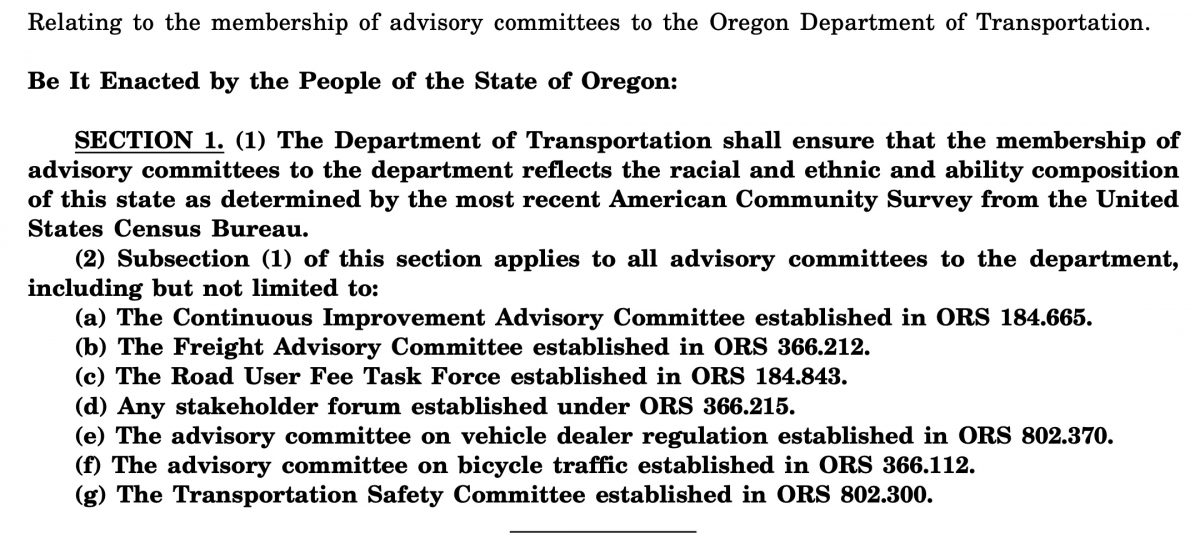
The bill was supported by Disability Rights Oregon, the City of Forest Grove, and the Forest Grove School District.
Reached for comment today, Billman said he feels the legislative victory will help usher in a new chapter at ODOT. “I think for the first time ODOT will have to represent the community they serve, the whole community. No more will the people with disabilities under the ADA be located in the office down the hall on the left. They will be at the table! For the first time people with adaptive mobility devices will be recognized by the committees that represent them. Single track ramps for diamond-frame bicycles will be no more! People using handcycles and new mobility devices will have a voice.”
The bill doesn’t require ODOT to make immediate changes to advisory committees. It would be triggered as vacancies arise.
The bill comes at a good time as micromobility continues to reshape how we think about who has rights to the road. “Bike lanes” are no longer just for bikes and as we open them up to electric scooters and other types of vehicles (they’ve always been open to wheelchair and mobility device users), this bill will help make sure we hear from a wider set of voices as we make decisions about projects, policies, and designs.
— Jonathan Maus: (503) 706-8804, @jonathan_maus on Twitter and jonathan@bikeportland.org
— Get our headlines delivered to your inbox.
— Support this independent community media outlet with a one-time contribution or monthly subscription.



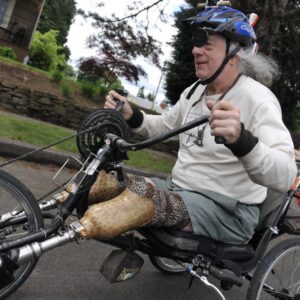
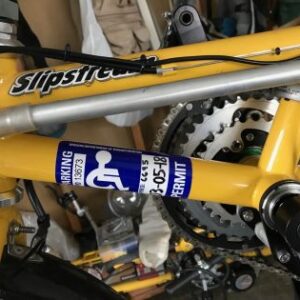
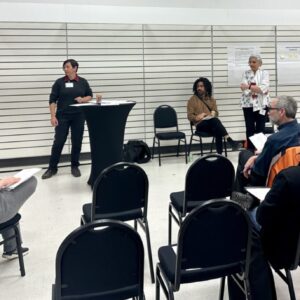
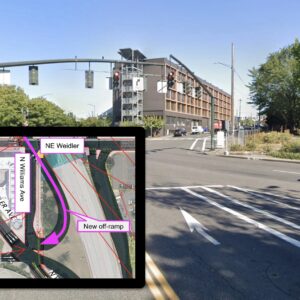
Thanks for reading.
BikePortland has served this community with independent community journalism since 2005. We rely on subscriptions from readers like you to survive. Your financial support is vital in keeping this valuable resource alive and well.
Please subscribe today to strengthen and expand our work.
I think this is great news but lets be real, advisory committees at the city, county, and state level don’t do anything. They exist for the sole purpose of allowing the agency, in this case ODOT, to pretend they are listening to the community.
If you didn’t buy your seat on an advisory committee, the agency doesn’t care what you think. This wont change ODOT because does ignore and will continue to ignore advisory committees that wont rubberstamp its agenda.
cmh89,
I understand this criticism and I too get frustrated when advisory committees aren’t as strong as I’d prefer and/or they are not respected as much as they should be… BUT your comment is extremely inconsiderate to the many really awesome people who volunteer their time to hold these agencies accountable to at least some level of oversight. I also find your comment to be simply untrue. I’ve sat in on 100s of advisory committee meetings over the years and to say they “don’t do anything” is totally false and it is rude to discount all the important work being done in them.
I really hope you are on some of these committees and that you aren’t just lobbing these claims from an armchair.
Thanks for your comment.
I’m sure they are awesome! I’ve sat on advisory committees, run advisory committees, and participated in many non-profit actions along with great people. Their awesomeness has absolutely nothing to do with the effectiveness of these performative outreach ACs. I think it’s a bit dishonest of you to try and make it seem like I was attacking the people who participate in the committee. My point is that these committees simply don’t provide oversight at all, not just in the realm of transportation. Just because you have awesome people on a committee doesn’t mean ODOT is going to care what they have to say.
Such as?
I’ve participated in the past. I’m not enough of an insider in Portland to get a spot on ACs for the city or state though. The whole point of ACs is to gather the usual suspects so they can all agree with each other, you make them feel heard, and then you do what you were going to do anyway. It’s why the Bike Advisory Committee is useless. When an AC does stand-up to an agency, the agency will simply ignore them or in the case of the Rose Quarter dissolve them and find new participants who will give them what they want.
Your opinion is one that many people have unfortunately. This new requirement will bring the underserved population to the table. It may not be the best situation but it’s a voice and a vote. The inclusion of adaptive mobility devices and the infrastructure requirements for those users have been overlooked for decades.
It’s a start to end a problem that plagued people with disabilities forever. Infrastructure has been designed for and by people using diamond frame bicycles and standard wheelchairs.
It’s evident when you look at the city bus the rack is for diamond frame bicycles and a space for a wheelchair inside. The same thing on Max and AMTRAK diamond frame bicycles roll on handcycles and recumbent bicycle you have to box up and pay shipping.
It’s a great opportunity for change that I believe will have a positive impact.
I don’t disagree with you in the slightest. Oregon as a state has historically and currently done a terrible job building and maintaining accessible infrastructure for folks with disabilities, which I’m sure you agree with.
My point is that the Advisory Committee, as a tool and not just for ODOT, is mostly a tool for governmental agencies to do performative outreach, not actually engage with the community.
I hope I’m wrong though and I hope this change in membership improves ODOTs terrible record.
I hope you’re wrong, too.